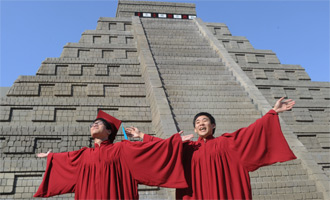
Bugarach (France), December 22: Diehard doomsayers hunkered down to await the apocalypse on Friday, but most took a lighthearted view of the Mayan “prophecy” of the world's destruction, laying on stunts and parties to while away the end.
“If you're in an underground bunker with a lifetime's supply of baked beans how stupid do you feel now?” asked one person on Twitter, which saw dozens of posts every minute joking about the failure of the world to end.
In the southern French village of Bugarach — rumoured to be one of the few places that will be spared when the end comes — dozens of journalists from across the world were bitterly disappointed at the lack of New Age fanatics to interview.
Police had wrongly anticipated an influx of visitors and blocked access to the village and the nearby Pic de Bugarach, a mountain which some say will open on the last day and aliens will emerge with spaceships to save nearby humans.
Hundreds of reporters also wandered aimlessly around the tiny village of Sirince in Turkey, hoping to grab a mystic taking refuge there.
Doomsayers identified Sirince — said to be the site from which the Virgin Mary ascended to heaven — as a safe haven that will be spared destruction thanks to the positive energy flowing through it.
And in Serbia, a pyramid-shaped mountain believed by some to be a source of unusual electromagnetic waves that could shield it from catastrophe, attracted record numbers of visitors.
December 21 marks the end of an era that lasted over 5,000 years, according to the Mayan “Long Count” calendar. Some believe the date, which coincides with the December solstice, marks the end of the world as foretold by Mayan hieroglyphs.
But scholars have ridiculed the idea, and say the date simply marks the end of the old Mayan calendar and the beginning of a new one.
The central American region where the Mayans lived saw a tourism bonanza in the run-up to the fateful December 21 date, with tourists snapping up all-inclusive excursions to Mayan holy sites.
It was also a chance to celebrate the contributions of the Mayan civilisation to mankind, but indigenous groups have accused governments and businesses of profiting from Hollywood-inspired fiction about their culture.
Thousands gathered at the majestic Mayan ruins of Tikal in the jungles of present-day Guatemala to await a fiery climax to the ancient civilisation's calendar.
Actors in costumes and head-dresses staged elaborate dances to a mournful pan-pipe tune ahead of the apocalypse supposedly foreseen by the Mayans, who reached their peak of power in modern-day Mexico and parts of Central America between the years 250 and 900 AD.
Australia was one of the first countries to see the sun rise on December 21, and Tourism Australia's Facebook page was bombarded with posts asking if anyone had survived Down Under.
“Yes, we're alive,” the organisation responded to fretting users.
Tongue-in-cheek scientists in Taiwan planted an electronic countdown timer atop a two-storey replica of a Mayan pyramid, drawing crowds at the National Museum of Natural Science.
Seven-year-old Wang Si-shien was unimpressed. “I'm not scared at all,” she said as she visited the museum with her school class.
Some argued online that an impending milestone for the “Gangnam Style” video of South Korean rapper Psy — one billion views on YouTube — was itself a harbinger of doom, enlisting a fake Nostradamus verse in their cause.
Across Asia, Europe and North America, many planned to party like there's no tomorrow with apocalypse-themed dinners and pub nights.
Hong Kong's Aqua restaurant promised to pick up the tab for its HK$2,112.12 ($273) six-course meal if the end is nigh — though patrons will have to stump up if still alive at midnight.
But there has also been a darker side in China, with authorities arresting some 1,000 people in a crackdown on a Christian sect that spread doomsday rumours.
If the world does end, Chinese furniture maker Liu Qiyuan has his own safe haven, a fibre-glass pod he designed that can carry up to 30 people and withstand towering tsunamis and devastating earthquakes.
A Dutch Christian has meanwhile painstakingly prepared a lifeboat in his garden capable of saving 50 people ahead of the biblical floods he expects to accompany Friday's “doomsday”.'
Over the centuries, the end of the world has been predicted countless times, from the early Christians to controversial US pastor Harold Camping last year.
US space agency NASA has been contacted by thousands of worried people asking what to do. In a web page devoted to debunking the Mayan prophecies, it reassured them that the world will not end in 2012.
“Our planet has been getting along just fine for more than four billion years, and credible scientists worldwide know of no threat associated with 2012,” it said.





Comments
Add new comment